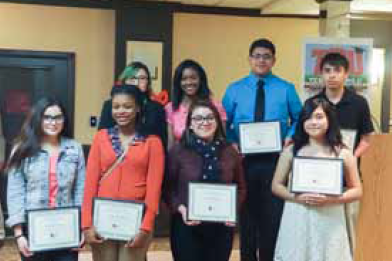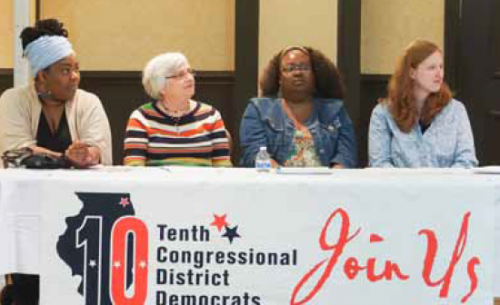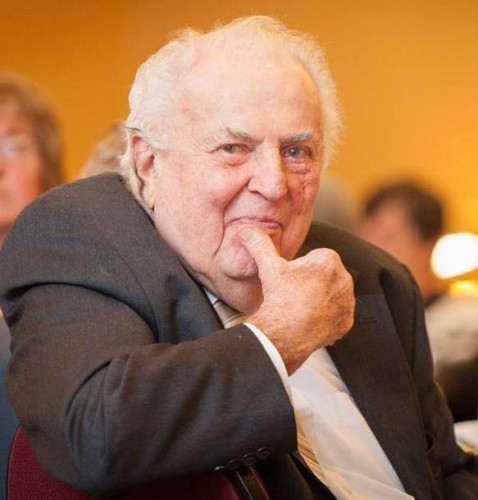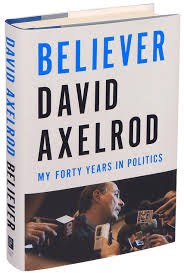by Carol Hillsberg
“Hope lies in dreams, in imagination, and in the courage of those who dare to make dreams into reality.” – Jonas Salk
Prompted to explore the theme “hope,” in March students from three high schools in north Lake County created and submitted stories, essays, and poems to the Fifth Annual Community Connection Writing Competition. The culminating event—Awards Night—took place Tuesday, April 14 at the Ramada Inn in Waukegan. Tenth Dems volunteers decorated the meeting room for the evening, and brightly colored renditions of the word “Hope” served as a cheery backdrop.
Students from Waukegan High School, Christo Rey St. Martin de Porres High School, and Zion Benton High School submitted nearly 300 original works of poetry and prose. Twelve prizes were awarded, six for poetry and six for prose. In each category, the first- place winner received $100, second place received $75, and third place received $50. In addition, there were three Honorable Mention awards in each category, which also included cash prizes.
The four competition judges, all of whom are professional, published writers, worked diligently to select the best among all the entries. In the interest of fairness, none of the works read by the judges included information about the author. All students’ works were identified by a number, with the identification key retained by volunteers who kept it far from the judges—an exercise in blind justice.
This year’s panel of judges was headed by Jacqueline Nicole Harris, who has judged this competition in prior years. Jackie is a writer, performance poet, and Shimer College graduate from North Chicago who works from home while trying to get out and give back to her community whenever possible. Her books can be found on Amazon and www.createspace.com.
The other three judges also brought stellar qualifications to their task. Lois Barr, a professor of Spanish at Lake Forest College, has been nominated for the Pushcart Prize for poetry and fiction. In addition, she is a literacy tutor at the Waukegan Library. Nina Geater, a Waukegan resident, has been writing and performing poetry since middle school. She volunteers with the Waukegan Park District, teaching a poetry class for youth. Heather Juanita Crain, a writer, performance poet, and visual artist, is a member of the Karcher Artspace community in Waukegan. She has mentored poets and hosted poetry open mics in Lake County for over four years, and is currently working on her first book of poems and essays for publication.
In addition, Elizabeth Bloom Albert served as “originality judge.” That is, she reviewed all of the submissions to ensure they were original works of the students. Elizabeth is a professional writer whose work has appeared in a number of literary magazines. Notably, Elizabeth counts as one of her greatest achievements the founding of this very writing competition, for which she served as chair in 2011 and 2012.
It was an excellent evening as nearly a dozen student writers, as well as each of the five volunteer judges, read their original works aloud. There were laughs, tears, and smiles, but, most of all, “hope.” With the talent and character displayed on Tuesday night, this generation inspired all present with the hope that the future will be bright.
The program began with a welcome by Hon. Mary Ross Cunningham, Lake County Board Member, District 9, who brought Hon. Lauren Beth Gash, Tenth Dems Founding Chair, Democratic State Committeewoman, and Illinois Human Rights Commissioner to the podium to introduce the evening’s emcee, Angelo Kyle. In addition to serving as a Pastor at Restoration Ministries, Rev. Kyle works at the Office of Regional Economic Development for the Illinois Department of Commerce and Economic Development. Among his many accomplishments, Rev. Kyle was the first African American Vice-President of the Lake County Forest Preserve.
Rev. Kyle began by explaining how Tenth Dems Community Connection was founded to bring people together, connect them to the resources they need, and demonstrate that, for Democrats, politics is about more than just elections. Exemplifying this conviction, the annual poetry and prose competition offers young people opportunities to show their talents and express themselves. These youngsters are indeed our “hope” for the future.
The evening’s program continued with readings of original works of prose and poetry by both the adult judges and some of the high school students who participated in the competition. In addition, Jacqueline Herrera Giron, who recently ran for 9th Ward Alderman in Waukegan, spoke in both Spanish and English about the privileges of participating in our democracy and the preciousness of the right to vote. Toward the end of the evening, Amanda Loutris, a high school student and Tenth Dems intern, described her internship experience and told the Awards Night participants how they could apply for an internship with Tenth Dems.
Among the students who participated in the open mic were Kala Juett, Tamara Sanchez, Sarahy Solano, La’Kendra Mayfield, who won first prize for poetry, Raimondi Tomeni, who won second prize for prose, Rosario Ocampo, who won second prize for poetry, Samantha Bahena, who won first prize for prose, and Jennifer Aguilera, Oswaldo Bahena, and Marjanae Maggett, all of whose prose garnered honorable mentions.
The culmination of the evening was the awards ceremony. In addition to those who read their prize-winning works, Daniel Gomez received third prize for poetry; Luis Pacheco earned third prize for prose; and Gustavo Baca, Lisette Hernandez, and Iris Sanchez received honorable mentions for their poems. All of the awardees’ works will be published later this year in a Literary Edition of the Tenth News.






